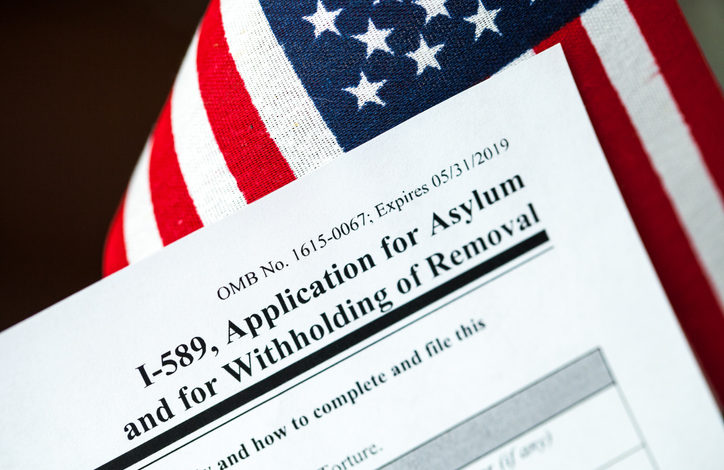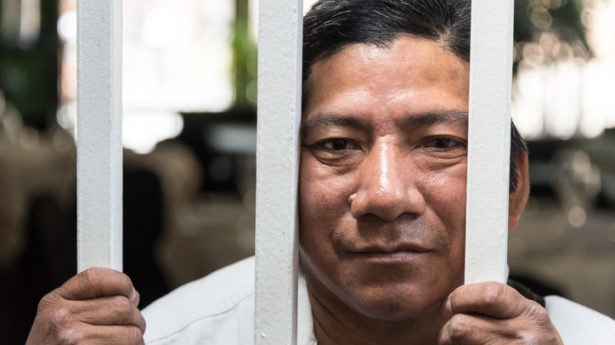The Unitarian Universalist Service Committee advances human rights through grassroots collaborations.
New Immigration Bill Threatens to Set Immigrant Rights Back by Decades

By Josh Leach and Mike Givens on May 16, 2019
On May 15, South Carolina Senator Lindsey Graham introduced a bill as part of a four-pronged strategy that he hopes will address what he calls a “perfect storm” at the United States-Mexico border.
Graham’s bill undermines the human right to seek asylum and compromises the safety of children and asylum-seekers. Many of these ideas have been floated before in Congress and have justly been defeated. These proposals contradict our values, our international obligations under refugee law, and our moral responsibility for the just care of children.
Although the text of the bill has not yet been released, the details in Graham’s press release are deeply concerning.
Lengthening Detention Stays for Minors
“Modify U.S. law to allow families to be held together up to 100 days in the United States while making their asylum claims—up from the current 20-day limit.”
A frightening aspect of this bill is language that would effectively increase the amount of time migrant children, whether accompanied by an adult or not, could be kept in detention. The 1997 Flores Settlement mandates that migrant minors be released from detention within 20 days of being detained by federal authorities; Graham’s bill would extend it to 100 days.
This bill would roll back current protections against long-term family detention. UUSC has extensively documented and written about the severe psychological and emotional trauma inflicted on children and families by long-term detention. Long-term detention of children—whether separately or as part of family units—also conflicts with international standards governing the just treatment of migrant children.
Refugee Processing Centers
“Asylum applications from residents of the Northern Triangle and contiguous countries would be filed at refugee processing centers—not in the United States. These centers would be established in the Northern Triangle and Mexico.”
Categorically denying people the right to apply for asylum at the U.S. border or within U.S. territory would reverse decades of U.S. asylum law and practice and contradict our obligations under international law.
It is true that creating a pathway to apply for asylum in one’s home country or a third country would be a positive component of a larger humanitarian response. However, it must not serve as a replacement for seeking asylum at the U.S. border or within U.S. territory, which Graham’s bill seems to propose.
In-country processing cannot serve as a replacement because applying for asylum or refugee status in one’s home country or a neighboring country is often not safe. The application process takes a long time, involves many interviews and tests, and can be an arduous process. Asylum-seekers are people who, by definition, are in flight. They cannot wait around for long periods in the places where their lives and safety are at risk. This leaves them at the mercy of their persecutors.
UUSC has written at length about the reasons why in-country processing cannot replace the need for other forms of asylum in our research into the Central American Minors (CAM) program under the Obama administration.
Due Process Violations for Minors
“Unaccompanied minors (UAC) from Central America would be treated the same as minors from Canada and Mexico. This allows the United States to return all UAC to their country of origin after screening.”
Currently, unaccompanied minors from countries not contiguous to the United States (including Central America) are exempt from “expedited removal” from the United States. This means that they cannot be simply apprehended and deported without due process, after a single questioning by a U.S. Customs and Border Protection agent. Rather, they are entitled to a full hearing before an immigration judge before they can be removed. Graham’s bill would reverse these legal protections, which are enshrined under the Trafficking Victims Protection Act.
In so doing, the bill would undermine due process for Central American children. Unaccompanied children need a full hearing of their asylum needs. They are in a uniquely vulnerable position and need time and a safe space for the details of their asylum case to emerge. Graham’s bill would deny Central American children this right and would risk returning many to danger.
If Graham’s dangerous bill passes, it will be a major blow to immigrant rights. Asylum-seekers would be turned away at the U.S. border and sent back to the hands of their persecutors, unless they applied through a time-consuming screening in their home countries that would leave them at risk. Families would be held in long-term detention, in violation of international standards and the best interests of children and families. Children would risk being deported to danger without ever having a chance to present their case for asylum before a judge.
A bill like this flies in the face of compassionate humanitarian response and will only serve to exacerbate the turmoil that thousands of migrants are experiencing as they flee violence, persecution, and corruption in their home countries.
Photo Credit: iStock – Eblis
***
About UUSC: Guided by the belief that all people have inherent worth and dignity, UUSC advances human rights globally by partnering with affected communities who are confronting injustice, mobilizing to challenge oppressive systems, and inspiring and sustaining spiritually grounded activism for justice. We invite you to join us in this journey toward realizing a better future!

